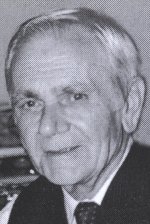 Imre Ruzsa
(1921-2008)
Imre Ruzsa
(1921-2008)
Imre Ruzsa
was the father of modern philosophical logic in Hungary and
the
founder of the Department of Logic at Eötvös University.
He was born on May
12, 1921 in Eastern Hungary. Having been a
political prisoner under Nazism and Stalinism, he was 35 by the time he
finished his studies at Eötvös University, as a student of Rózsa Péter. He briefly
taught students in mathematics before moving on to teach philosophy
students. In 1965, he was appointed a research fellow at the Institute
for Philosophical Research at the Hungarian Academy of Sciences. In
1971, he moved to Eötvös University; to the Department of Logic of the Faculty of Humanities, at that time chaired
by a Marxist-Leninist dialectical logician. In 1982, he succeeded in
separating modern logicians from the "dialectical logic" tradition, and
founded a new department under the name "Department of Symbolic Logic
and Methodology of Science" - it is this department that is now called
the Department of Logic. He was appointed full professor in 1978 and
professor emeritus in 1998. He received the Széchenyi Prize in 1991.
His professional
interests centered around modal logic, intensional
logic, modeling natural language in systems of intensional logic, and
the foundations of logic and mathematics. He always thought of his
generalization of A. N. Prior's concept of semantic value gaps to
quantified, intensional and type-theoretic systems as his most
important contribution to logic. He was the author of three books in
English (Modal Logic with Descriptions, The Hague, 1982, Intensional
Logic Revisited, Budapest, 1991, Introduction to Metalogic, Budapest,
1993), several monographs and textbooks in Hungarian, and many articles
in leading logic journals. Many of his former students are now renowned
experts in logic, philosophy, and linguistics at departments across
Hungary, Europe, and the United States.
He
died on July 2, 2008 in Budapest.







